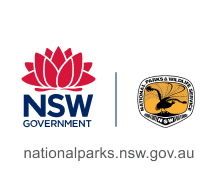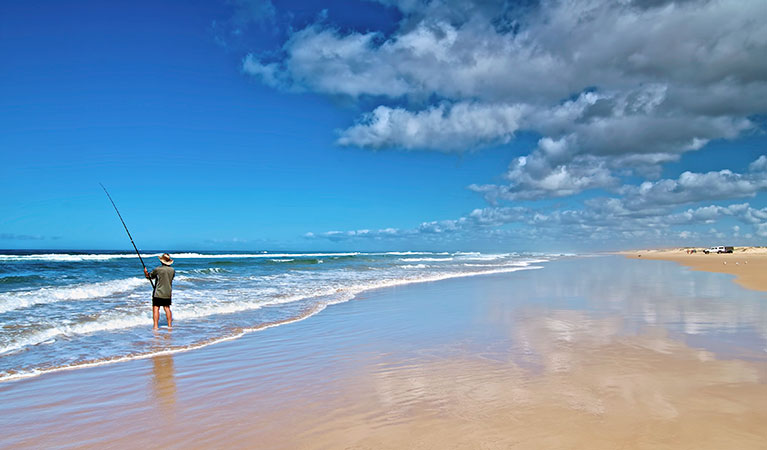Worimi National Park
Overview
Worimi National Park is a special Aboriginal place near Newcastle. Enjoy whale watching, fishing and beach driving on the Worimi Conservation Lands.
Read more about Worimi National Park
Worimi Conservation Lands includes Worimi National Park along with Worimi State Conservation Area and Worimi Regional Park.
Located near Newcastle, the Worimi Conservation Lands are owned and co-managed by the local Worimi Aboriginal community in partnership with NSW National Parks. The Stockton Bight landscape is home to an extraordinary number of ancient cultural sites.
If you’re visiting for the day, you’ll find there is heaps to do; fishing, birdwatching or the ever-popular pastime of beach driving. Take a guided tour and check out traditional Aboriginal sites of the Worimi People, take a sand dune safari or go horse riding along the beach. And don’t miss the gigantic Stockton dunes, the largest moving coastal sand dunes in the southern hemisphere.
With so much to do, you might need to extend your stay. Find out more about camping in the Worimi Conservation Lands. A range of accommodation options are available within a short distance of the park - contact the Port Stephens Visitor Information Centre for more details.
Local alerts
For the latest updates on fires, closures and other alerts in this area, see https://www.nationalparks.nsw.gov.au/visit-a-park/parks/worimi-national-park/local-alerts
Map
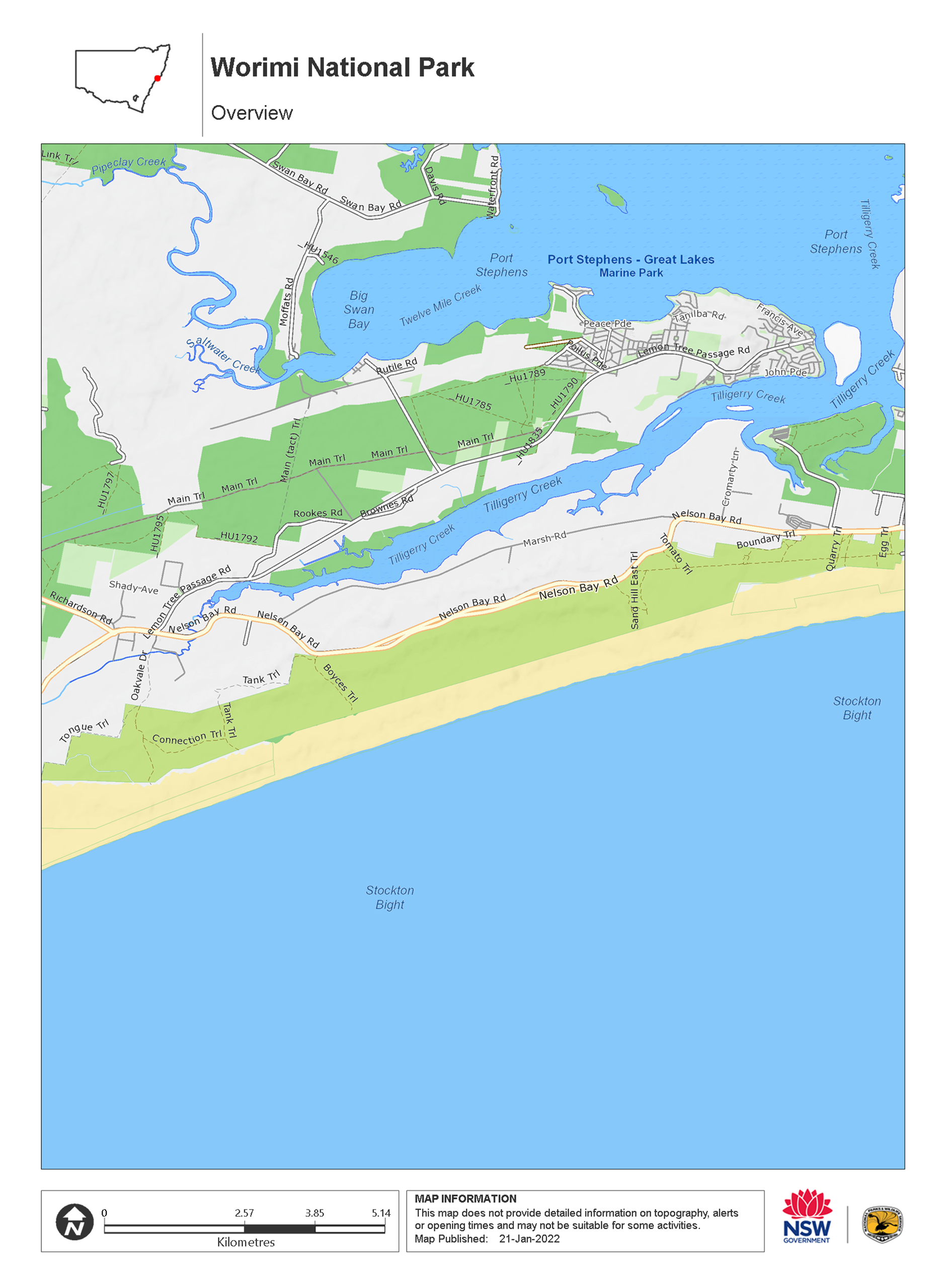
Map legend
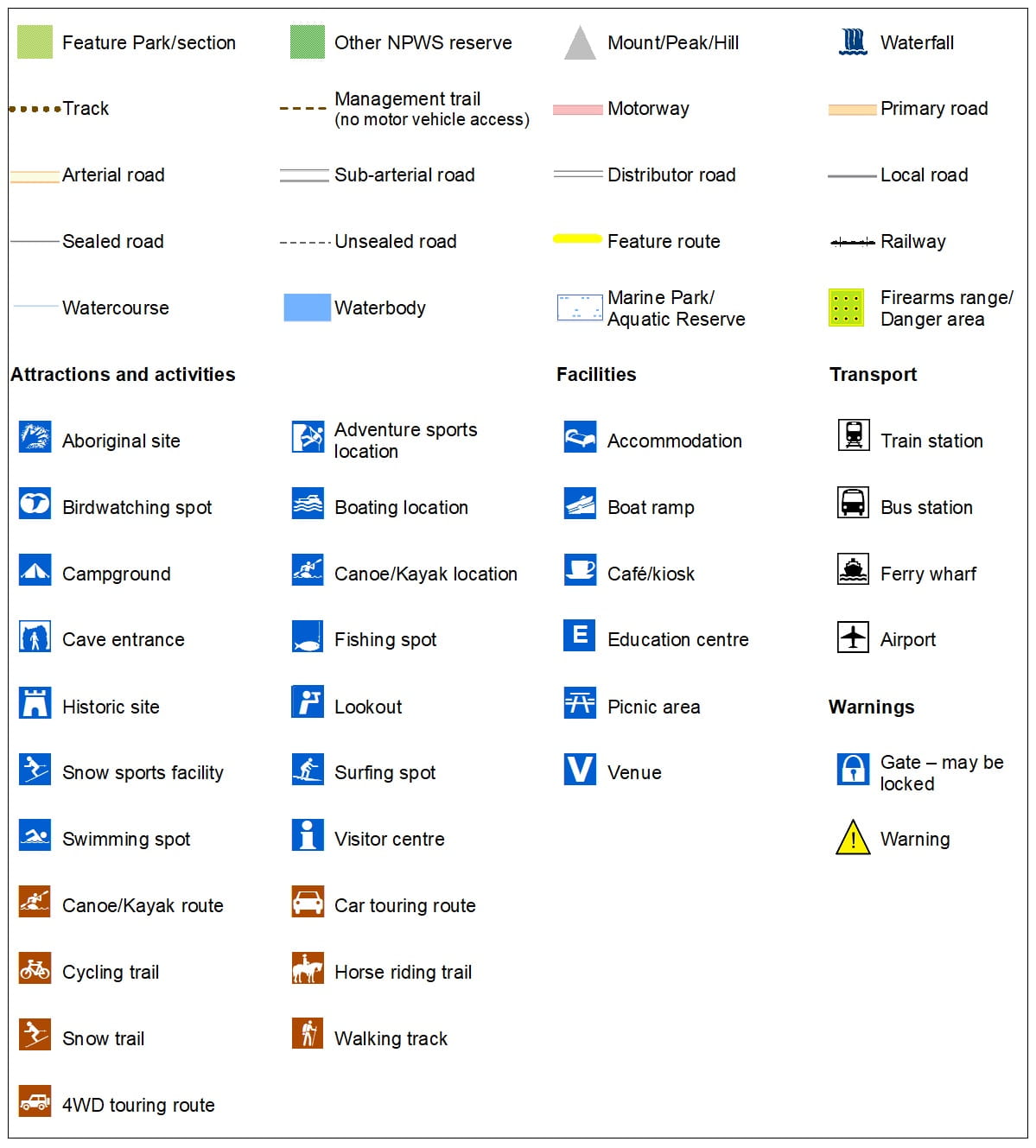
Contact
- in the North Coast region
Worimi Conservation Lands are always open but may have to close at times due to poor weather or fire danger.
-
Annual NSW Park Passes are not valid for entry to Worimi Conservation Lands.
Visitors to Worimi Conservation Lands need to buy a Beach Vehicle Permit before arriving. Also find out where you can drive your vehicle in Worimi Conservation Lands.
Worimi National Park, Worimi State Conservation Area, and Worimi Regional Park, form part of the Worimi Conservation Lands. Located near Newcastle, the Worimi Conservation Lands are owned and co-managed by the local Worimi Aboriginal community in partnership with NSW National Parks.
See vehicle permits. -
-
Anna Bay office
02 4984 8200
Contact hours: Monday to Friday, 8.30am to 4.30pm. - 4154 Nelson Bay Road, Anna Bay, NSW 2315
-
Email: npws.huntercoast@environment.nsw.gov.au
-
Anna Bay office
Visitor info
All the practical information you need to know about Worimi National Park.
Maps and downloads
Nearby towns
Nelson Bay (10 km)
Nelson Bay is a major holiday playground and the main resort area of Port Stephens. It's located on the southern shores of Port Stephens.
Newcastle (28 km)
Newcastle is a harbour city surrounded by amazing surf beaches that are linked by a great coastal walk, the Bathers Way. The walk from Nobbys Beach to Merewether Beach takes about three hours and is a great way to explore the city.
Cessnock (55 km)
Some of the finest wines in the world are created in the Hunter Valley and its towns, gourmet food is acclaimed and luxury, boutique accommodations are matched by the most beautiful natural scenery.
Learn more
Worimi National Park is a special place. Here are just some of the reasons why:
Dynamic dunes

Set your sights on the southern hemisphere's largest mobile coastal sand mass at Stockton Bight. The landscape's creation began well over 100,000 years ago, and believe it or not, these enormous dunes are 'alive' and forever changing. Stockton itself at 32km is the state's longest beach, and its dunes offer endless appeal. Their shape, slope and stability vary with the weather. This unpredictability, potential for damage to Aboriginal cultural sites, and possible impacts to plants and animals are important reasons why we ask you not to drive over the dunes.
- Quad Bike King tours in Worimi sand dunes Jump onto your very own 4WD quad bike and join the professional guides from Quad Bike King for an adrenaline-filled adventure in the pristine dunes of Worimi National Park, near Port Stephens and Newcastle.
- Sand Dune Adventures quad bike tour Tackle the dunes on 4WD quad bikes with Sand Dune Adventures, an Aboriginal-owned tour company. For beginners or advanced riders, it's a thrilling way to see Worimi's spectacular coastal dunes.
- Worimi guided sandboarding and sand surfing adventures Join Sand Dune Safaris for an epic adventure in Worimi National Park. Learn how to sandboard or take on a sand surfing challenge on the largest moving sand dunes in the Southern Hemisphere.
- Worimi sand boarding adventure in coastal dunes Spend an unforgettable day sand boarding and exploring spectacular coastal dunes with Port Stephens 4WD Tours.
- Worimi sand boarding with 4WD Tours R Us Explore pristine Worimi National Park with the friendly guides of 4WD Tours R Us and get your adrenaline pumping with a sand boarding adventure on the dunes of this stunning coastal wilderness.
Beach activities

Surfing, fishing, whale watching, bird watching, dog walking, horse riding, quad biking, beach walking; the list continues. Stockton Beach is an absolute treasure trove for sun-lovers. Enjoy a unique driving experience on a 4WD tour. It's a beach holiday you'll remember long after you've shaken the sand from your shoes.
- Port Stephens guided camel rides Explore the vast sand dunes of Worimi National Park on camelback with Oakfield Ranch Camel Rides. Your guides will take you on a tour along beautiful Birubi Beach, near Port Stephens.
- Port Stephens half-day beach fishing safari Port Stephens Beach Fishing Safaris specialise in small group fishing tours. Climb aboard one of their comfortable 4WDs to find the best fishing spots on Worimi Conservation Lands, near Newcastle.
- Worimi beach horse riding tours Experience the pristine coastline of Worimi Conservation Lands on a guided tour with Sahara Trails Horse Riding.
An ancient heritage

When you visit Worimi Conservation Lands, you'll step into a place abundant in Aboriginal cultural history. There are an extraordinary number of Aboriginal cultural sites that pre-date European settlement, scattered throughout the dunes. These include middens, campsites and burials, all of which reflect the cultural use of the land and have special cultural significance to the Worimi people.
- Sand Dune Adventures quad bike tour Tackle the dunes on 4WD quad bikes with Sand Dune Adventures, an Aboriginal-owned tour company. For beginners or advanced riders, it's a thrilling way to see Worimi's spectacular coastal dunes.
- Worimi guided sandboarding and sand surfing adventures Join Sand Dune Safaris for an epic adventure in Worimi National Park. Learn how to sandboard or take on a sand surfing challenge on the largest moving sand dunes in the Southern Hemisphere.
A forest beyond the dunes

Worimi National Park comprises sandy stretches of beach and mobile sand dunes in fact, at Stockton Bight, you’ll find the largest mobile coastal sand mass in the southern hemisphere. If you venture beyond the dunes, you can find forest thriving with coastal sand apple blackbutt and swamp mahogany paperbark trees. The area is part of Worimi Conservation Lands, including over 1,800ha of forest.
Plants and animals protected in this park
Animals
-
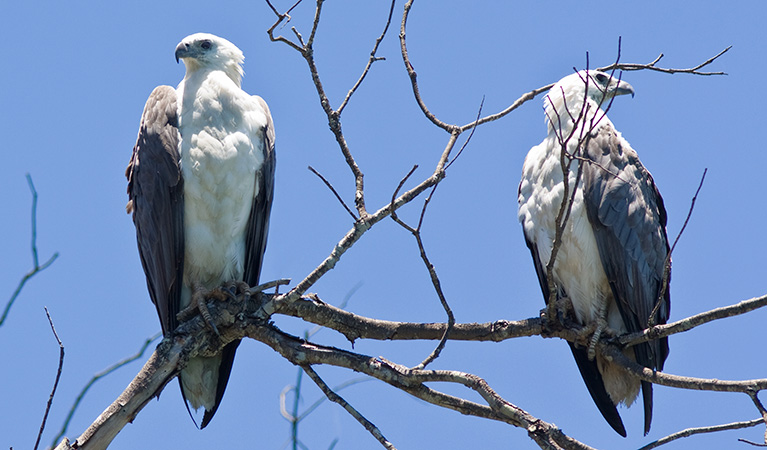
White-bellied sea eagle (Haliaeetus leucogaster)
White-bellied sea eagles can be easily identified by their white tail and dark grey wings. These raptors are often spotted cruising the coastal breezes throughout Australia, and make for some scenic bird watching. Powerful Australian birds of prey, they are known to mate for life, and return each year to the same nest to breed.
Plants
-

Old man banksia (Banksia serrata)
Hardy Australian native plants, old man banksias can be found along the coast, and in the dry sclerophyll forests and sandstone mountain ranges of NSW. With roughened bark and gnarled limbs, they produce a distinctive cylindrical yellow-green banksia flower which blossoms from summer to early autumn.
-

Smooth-barked apple (Angophora costata)
Smooth-barked apple gums, also known as Sydney red gum or rusty gum trees, are Australian native plants found along the NSW coast, and in the Sydney basin and parts of Queensland. Growing to heights of 15-30m, the russet-coloured angophoras shed their bark in spring to reveal spectacular new salmon-coloured bark.
Environments in this park
Education resources (1)
What we're doing
Worimi National Park has management strategies in place to protect and conserve the values of this park. View the detailed park and fire management documents. Here is just some of the work we’re doing to conserve these values:
Managing weeds, pest animals and other threats
Pests and weeds have a significant impact to the ecosystems within Worimi National Park. NPWS carries out risk assesments for new and emerging weeds as well as wild dog control to protect biodiversity in this park.
Managing fire
NSW is one of the most bushfire prone areas in the world as a result of our climate, weather systems, vegetation and the rugged terrain. NPWS is committed to maintaining natural and cultural heritage values and minimising the likelihood and impact of bushfires via a strategic program of fire research, fire planning, hazard reduction, highly trained rapid response firefighting crews and community alerts.
